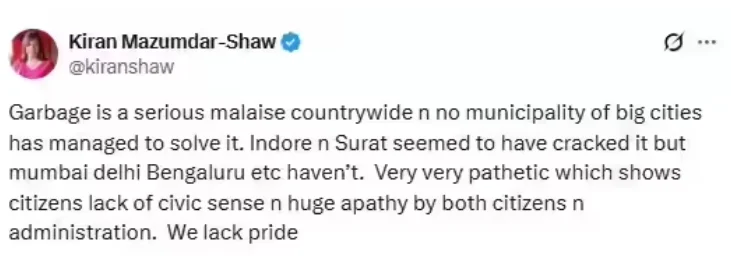A day after a public online exchange with deputy chief minister D K Shivakumar over the city’s crumbling infrastructure, Biocon chief Kiran Mazumdar-Shaw reignited the debate on Thursday — this time drawing attention to Bengaluru’s persistent garbage problem. Taking to X (formerly Twitter), Shaw described the city’s waste management issue as a “serious malaise” and criticised both citizens and civic bodies for their collective apathy.
Shaw calls garbage problem a “serious malaise”
“Garbage is a serious malaise countrywide and no municipality of big cities has managed to solve it. Indore and Surat seemed to have cracked it, but Mumbai, Delhi, Bengaluru, etc., haven’t. Very very pathetic, which shows citizens’ lack of civic sense and huge apathy by both citizens and administration. We lack pride,” Shaw wrote in her post.
Her remarks came just a day after a heated online exchange with Shivakumar, who had accused her of “betraying” the state for criticising Bengaluru’s infrastructure. Shaw’s latest comments have once again spotlighted the city’s mounting civic challenges and the lack of effective waste management policies.

Criticism of government inaction
The Biocon chief, who has long been vocal about Bengaluru’s infrastructure woes, said the city’s current state was the result of years of negligence by successive governments. “We are in this situation because of past governments’ failure to act in time. This government has the opportunity to change and act fast to fix these decades of deteriorating infrastructure,” she said, adding that ministers must hold the Greater Bengaluru Authority (GBA) accountable for “shoddy and slow work.”
She further emphasised that civic improvement could only be achieved if both the government and citizens worked together, stating, “Here, the government and citizens need to be on the same page.”
Political response from D K Shivakumar
Shivakumar, who also handles the Bengaluru development portfolio, responded sharply, accusing Shaw of tarnishing the reputation of the state and the nation that “helped her succeed.” He maintained that the government was actively addressing the city’s infrastructure and waste management issues, pointing to recent initiatives aimed at improving road quality and traffic management.
Other senior Congress ministers echoed his remarks, calling Shaw’s statements “unfair” and “one-sided.” They asserted that ongoing projects under the “Brand Bengaluru” initiative would soon bring visible improvements.
Citizens back Shaw’s stance
Despite political pushback, Shaw’s comments received widespread support from Bengaluru residents and civic activists. Citizen groups, including Whitefield Rising (@WFRising), came out in her defence, labelling Shivakumar’s response as a “classic deflection tactic.”
The group wrote, “This is not about politics. It’s about accountability. Citizens are tired of being blamed for the government’s inefficiency.”
Several social media users also backed Shaw’s call for transparency and action. One user, Viky (@urstrulyvikass), commented, “Ma’am, we stand with you. It’s our fundamental right to ask questions. We pay taxes and deserve basic infrastructure, water, and electricity.”
Broader issue of civic accountability
The controversy reflects Bengaluru’s growing civic frustration — from uncollected garbage and pothole-ridden roads to traffic gridlocks and flooding. While citizen-led campaigns have repeatedly pushed for better governance and waste segregation, implementation on the ground remains inconsistent.
Urban experts argue that Bengaluru’s waste management crisis is the result of fragmented administration and overlapping authorities. Many residents say accountability among agencies like BBMP and GBA remains weak, leading to recurring issues despite large budgets allocated for urban renewal.
Conclusion
Kiran Mazumdar-Shaw’s outspoken stance once again brings to the forefront the ongoing tension between Bengaluru’s business leaders, citizen activists, and political leadership. While the government insists that progress is underway, residents argue that the pace of improvement does not match the urgency of the city’s challenges.
As Bengaluru continues to grapple with rapid urbanisation, the latest exchange serves as a reminder that fixing the city’s infrastructure and garbage problems will require not just funds, but sustained cooperation between citizens and those in power.
